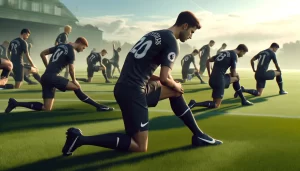Are you interested in a career as a football scout? Well we have you covered. This section lists everything you need to know to start or progress your football scout career. Find out the exact course you need to get started, where to find the scouting jobs and resources that will help you stand out from the rest.
This SKYBET videos gives a great insight in the life of a football scout
The Role of a Football Scout
Every football club works with a network of football scouts in order to increase their chances on spotting talent. Clubs do not always have the time or resources to find the next Messi or Ronaldo, so they need extra eyes and ears when it comes to scouting players. Especially since some of the best talent may not even be playing for a club or grassroots team.
Although one of the best ways to get a trial may be by attending a soccer school, parents often put too much pressure on the child by ensuring they perform well to impress the coaches, instead of enjoying themselves. This is where a scouts discretion is vital.
Scouts turn up to matches unannounced, and assess children without making their identity known, especially to parents. This enables them to stealthily visit soccer schools, grassroots and school matches to find the talent that they are looking for.
A football scout won’t just be looking for raw talent. They look for an individual player’s commitment to football training and fitness.
The Process of Scouting
So What is a Football Scout?
A football scout acts as the eyes and ears for football clubs. They are on the grout watching matches from grass roots to professional level, to ensure not to miss any potential.
They are football professionals that are considered a partner of the club, and use their experience in football to build a database of intelligence in the local area, listing potential children for trials, which the club can then assess against.
You should NEVER pay a football scout, since they are an employee of the club and earn their money from the football club itself, when new players are successfully given contracts to join academy’s or the youth teams. Normally in a commission based agreement.
A football scout represents a football club, and has an agreement with the football club on the standard of talent that they will put forward for football academy trials. There is no limit on the number of children that they can offer a trial to, as some years may have more talent than others, and they seek a fair opportunities for each talented young footballer.
However getting a trial is not easy, as the scout’s reputation lies in the quality of who they choose to invite to trial. Reputable scouts spend years building up their relationship with a football club, and will protect this, so if they are in any doubt, they will not offer a football trial at the club’s academy.
The Future of Football Scouting
Where Will Football Scouts Be Looking?
Small clubs generally use scouts in their local areas due to budgets, but large mega clubs like Manchester City and Arsenal will use scouts from all over the world. The bigger the network of scouts that the football club operates with, the more chance they have of finding talent before their competitors.
A football scout will be looking in obvious and less obvious places, and often turn up unannounced to places where matches or training session are being held.
- School sports teams
- Local football tournaments
- Local parks and recreational facilities
- Local football clubs
- By attending as many football games as possible
- Attending lower-league club games to compare young talent to older peers
- Under-16, 18 and 21 international tournaments
- Tip offs from teachers, agents, peers and club colleagues
- You TUBE, where young talent upload their videos directly, in hope of being spotted
Types of Football Scouts
There are two types of football scouts, player scouts and tactical scouts.
About Player Scouts
A player scout is looking specifically for young footballing talent, with the purpose of helping them to sign a contract with the football club in which they are representing. A contract in the eyes of the scout will be either to join the youth academy after a successful trial, or even to join the youth squad or first team itself.
A player scout will look to:
- Discover future stars. This can earn the most money for the scout since the higher the level a discovered player reaches, the higher the pay-out for the scout.
- Find potential signings. This pays less, but enables a scout to get paid from a number of different players. In this case, a scout may already know that an academy is lacking certain positions, and therefore will look for local talent playing in those positions and push them through even if they aren’t ‘stars’, since the opportunity is still there and the club needs to fill all positions.
About Tactical Scouts
A tactical scout is more analytical. They assess the competition’s talent in order to spot strengths and weaknesses, so that the football club they are working for can combat potential threats and also plan for opposition weakness in training.
For example, a tactical scout will also go to a football match, but beforehand will prepare stats on each of the opposition’s players.
As a general rule of thumb, most tactical scouts are full time employees of the football club, since this analytical approach is time consuming and requires industry expertise. Tactical scouts are a protected commodity in the footballing industry, since having the ability to pull out the strengths and weaknesses of the opposition is a huge and very confidential algorithm based upon each players abilities, fitness, injuries, skill sets etc.
A majority of football scouts are not employed full time. They work on commission, which enables a club to grow their network rapidly, and enables the club to work with hundreds of scouts at any given time. To put this into perspective, Spanish Primera Liga team Sevilla FC has a global scouting network of 700 player scouts!
The big clubs like Manchester United, Tottenham Hotspur, Arsenal and Chelsea employ a big group of tactical scouts to do the following:
- Offer expert advice to the club, and consult on the tactical approach that the club is taking to win games. An example of this might be when to attack the opposition and when to sit back in order to strike on the counter
- Opposition team’s favoured attacking method and strategy
- Opposition team’s favoured defence structure and tactics
- Summarise how to deal with the oppositions key strengths. For example, a left back with a weak right foot can be marked in a way that will force them onto their weaker foot, to increase the chances of mistakes
- Watch football matches for games with upcoming opponents to create an opposition report, assessing the oppositions strengths and weaknesses
- Service the club to assess their own strengths and weaknesses in both the club and academy teams
- Provide dossiers to the football club with recommendations for club coaches on what to teach, and what skills to work on with each footballer
- Reports for players to read on themselves to help improve their awareness, training, and abilities physically and mentally
- Create DVD’s/video footage of key opponents skills to analyse how they will play against the club. These videos are watched by club coaches, player staff and players
- Summarise findings for referring to
Tactical Scout Player Assessments
A typical player assessment from a tactical scout will look at the following:
- Assess passing patterns and playing tempo of the opposition and team
- Look specifically for the following types of weaknesses in the opposition, to make a game plan of attack that forces them to make mistakes: concentration, strength, pace, stamina
- Highlight weaknesses in each player and make suggestions on how to break them down to force their weaknesses on them
- Summarise findings for referring to
Winger Tactics
A typical winger player assessment from a tactical scout will look at the following:
- Identify which part of the field they cut in towards the goal
- Identify which part of the field they cut out to stay wide
- The wingers sprint and attack moves, and spotting this in wingers before it happens
- Preferred moves in each player
Penalty Kick Taker Tactics
A typical penalty kick taker assessment from a tactical scout will look at the following:
- The players preferred side for shooting
- The players preferred foot
- The players eye movements before taking the penalty and how this matches up with their choice in shot
- The preferred goal corner
- Statistically which part of the goal the player shoots at
Importance of scouting
Scouting is the most important function to a clubs margin, since bringing talent directly into a club from a young age is cost effective as the player doesn’t have to be bought, and gives the player longer to mould into the footballs style of play.
For players bought into clubs or transferred, it can sometimes take years for them to understand the style of football at the club they are in.
When players are brought through the academy, the Football Association (the FA) pay the club for every time the player plays in the league, as an incentive to keep the scouting process flowing. So it is in the football clubs best interests all round to keep academy players on their side. The FA does this as football plays such a big role in communities, and encourages fitness and team play amongst children and adults.
Some scouts have reportedly had databases of potential players, of up to 70,000! So having good scouts, is an essential way for football clubs to find the talent they are looking for. It has also been reported that some teams will invite an average of 15 to 20 scouts per game to a game if it is big, since every scout has their own way of assessing, and using multiple opinions, can change overall results of whether or not a player is brought to an academy trial.
Advantages of Scouting
Using scouts in football is advantageous for the following reasons:
- Club receives specialist tactical advice
- By scouting opposition, football clubs can build up an immense amount of intelligence on other teams to use in upcoming matches
- Instant global reach
- Allows clubs to infiltrate communities away from their immediate geographic location
- Football clubs can save money by sending scouts to lower leagues, where the cost of buying in players is much cheaper than if they looked in the well-publicised limelight of the top leagues. This also saves money on player wages, since the players will not demand as much money
- Using players from lower league backgrounds can also mean that the commitment from the player is higher than a player that has shot up through the main club system, as they can appreciate the opportunity














